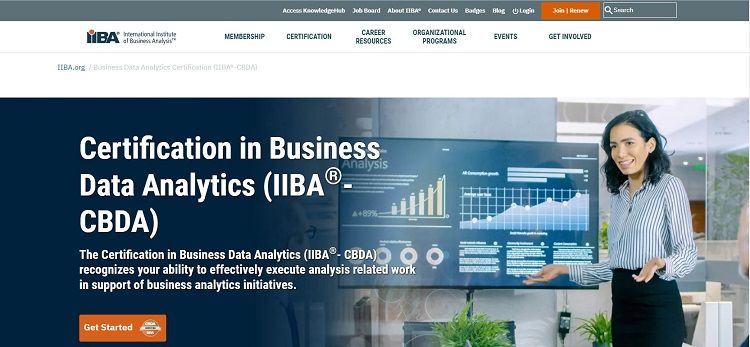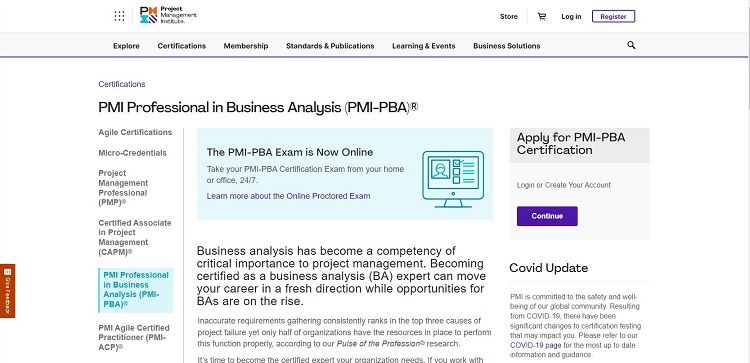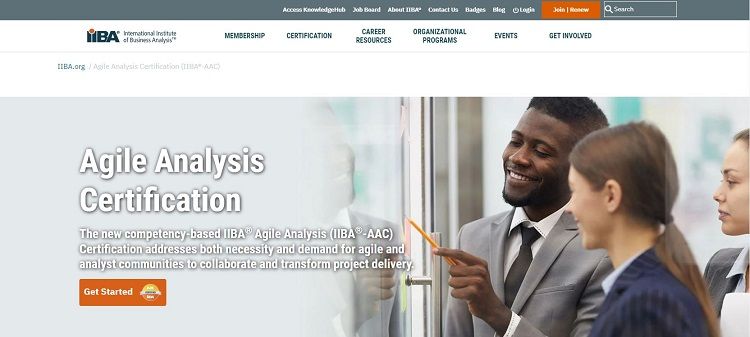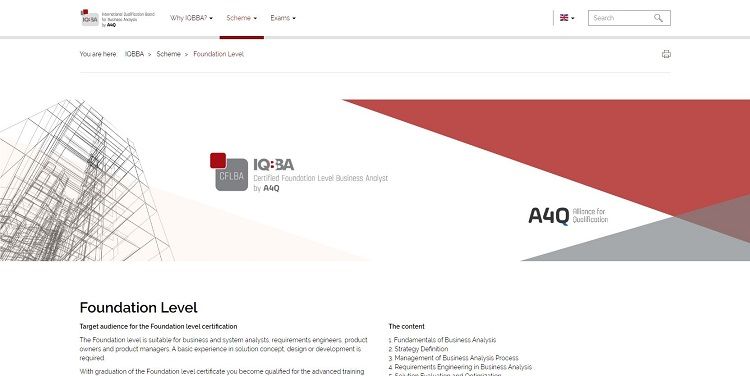As a business analyst, you identify and merge business needs with information technology resources to improve productivity and efficiency. Pursuing a certification can increase your chances of earning a higher salary.
A business analyst certification can help you stand out as an ideal candidate for available jobs and help you make a greater impact at work. Some certifications available have specific requirements you need to meet before starting the process. Be sure to check you meet the prerequisites before choosing to invest in a certification program.
1. Entry Certificate in Business Analysis (ECBA)
The ECBA is the first level of certification you can earn with the International Institute of Business Analysis (IIBA). The accreditation is for less experienced, entry-level business analysts looking to improve their skills.
The IIBA requires you to complete 21 hours of professional training credits within the last four years before taking the exam. The ECBA is one of the few certifications that doesn't require you to renew it because you have the opportunity to move on to the second or third level of certification after completing the ECBA.
Completing your ECBA tells employers you have a foundational knowledge of business analysis practices. If you've been considering getting a certification for a while, you may have noticed Coursera offers certifications. You may be asking yourself can a Coursera certificate get you a job?
2. Certificate of Competency in Business Analysis (CCBA)
The CCBA is the second level of IIBA certification. It requires a minimum of 5,750 hours of business analytics work aligned with the IIBA's Business Analysis Book of Knowledge (BABOK) guide in the past seven years.
You also need 900 hours in two of the six BABOK knowledge areas or 500 hours in four of the six BABOK knowledge areas. The IIBA requires that applicants complete 21 hours of professional development training in the previous four years and two professional references.
The CCBA exam has scenario-based questions requiring you to do some analysis. There are 130 multiple-choice questions in the exam, and they cover vital concepts, fundamentals, underlying competencies, techniques, and all six knowledge areas covered in the BABOK.
The CCBA is an excellent choice for anyone with mid-level experience in business analysis that wants to improve their skill set. Accomplishing the certification shows employers your ability to apply business analysis techniques to real-life situations.
3. Certified Business Analysis Professional (CBAP)
The CBAP is the third level of IIBA certification. The IIBA created this certification for people with substantial experience as business analysts. To qualify for the CBAP, you need 7,500 hours of business analysis work experience in the past ten years, 900 hours of work experience hours within four of six BABOK knowledge areas, and a minimum of 35 hours of professional development in the last four years in addition to professional references.
The exam has 120 multiple-choice questions based on case studies, and IIBA gives you 3.5 hours to complete the exam. After passing the exam, you must report that you've taken 60 hours of continuing development units every three years. The CBAP is for professionals with a lot of business experience who are passionate about the subject and want to become an expert in business analysis.
The certification process allows you to master the latest business analysis techniques and leadership qualities and is considered one of the essential certifications for business professionals. If you're into data, you might be interested in learning about the data engineer and data architect certifications to upgrade your skills.
4. Certification in Business Data Analysis (CBDA)
The CBDA is a relatively new certification, recognizing your ability to perform analysis-related work supporting business analytics projects. Candidates should have practical skills in application areas, such as customer experience management, information security risk management, strategy execution, and change management.
Passing the exam requires you to examine a real-world business problem, identify data sources, learn how to gather data, analyze it, and interpret and report the results from the data. You also need to demonstrate how results can influence business decision-making and guide company-wide strategies for business analytics.
Achieving your CBDA lets employers know you are qualified to help their organization manage data analytics initiatives and priorities. If you're considering a job in data analysis, you may be interested in learning about the top high-paying jobs for data analysts.
5. Professional in Business Analysis (PBA)
The Project Management Institute (PMI)'s Professional in Business Analysis (PBA) certification is designed for business analysts who work with programs or projects or program and project managers who work with analytics. The certification focuses on business analysis training with hands-on projects and testing on business analysis fundamentals, principles, and tools.
If you have a bachelor's degree, you need three years of work experience or 4,500 hours in business analysis consecutively within the last eight years to earn your certification. You need five years or 7,500 hours of work experience without a degree. You must also achieve 60 professional development units within three years of completing the certification to maintain your renewal status.
The PBA is one of the most widely accepted and recognized business analysis certifications. If you allow your renewal to lapse, the PMI can suspend your credentials for a year until you meet the requirements. If you've been considering pursuing a certification in project management, you may be interested in learning why you should go for a PMP certification to advance your tech career.
6. Agile Analysis Certification (AAC)
Agile methodology is becoming increasingly more important to business analysts, according to the IIBA. The IIBA has designed the exam to address the required skill set and certify business analysis professionals working in agile environments that require fast adaptation and rapid change. The IIBA developed the exam using the agile extension to the BABOK knowledge guide they released in May 2018.
Unlike other IIBA certifications that build on one another, the Agile Analysis Certification (AAC) is a standalone certification. The exam is offered via remote online proctoring and has 85 multiple-choice scenario-based questions that you have 2 hours to complete. The exam covers four main topics, and the breakdown is as follows:
- Agile mindset—30%
- Strategy horizon—10%
- Initiative horizon—25%
- Delivery horizon—35%
The AAC is good for three years, and then you need to renew it. When pursuing your AAC, working with a team that focuses on completing projects quickly and deals with constantly changing objectives and requirements is helpful.
7. Certified Foundational Level Business Analyst (CFLBA)
The Internal Qualifications Board for Business Analysts (IQBBA) offers the CFLBA program. The CFLBA is an entry-level certification that requires you to earn higher levels of accreditation with the IQBBA.
The CFLBA is a globally recognized certification with accredited exams and training centers in international locations. The IQBBA designed the CFLBA for people involved in organizational business processes, modeling processes, and business improvements. The foundational certification covers innovation and design, tools and techniques, investigation, and business analysis process planning.
Once you've completed your CFLBA, you may pursue your Certified Advanced Level Business Analyst (CALBA) and Certified Expert Level Business Analyst (CELBA) certifications. IQBBA-accredited exam and training centers in the U.S. are limited to Texas, Florida, Oklahoma, Maryland, and Chicago centers. If you're not close to any of those cities, there is an option to take the courses and exams online.
Which Certification Will You Choose?
If you've already decided that you want to elevate your career by pursuing a certification, you now know that there are quite a few options to choose from. You must do your homework and ensure you meet the minimum requirements before making a choice.
Don't be afraid to share your plans with your manager or supervisor. They may be able to help you gain the hours you need by assigning extra project tasks to you. If you're unsure if a certification in business analysis is what you want to pursue, you can learn about other certifications that can help you advance your career.








